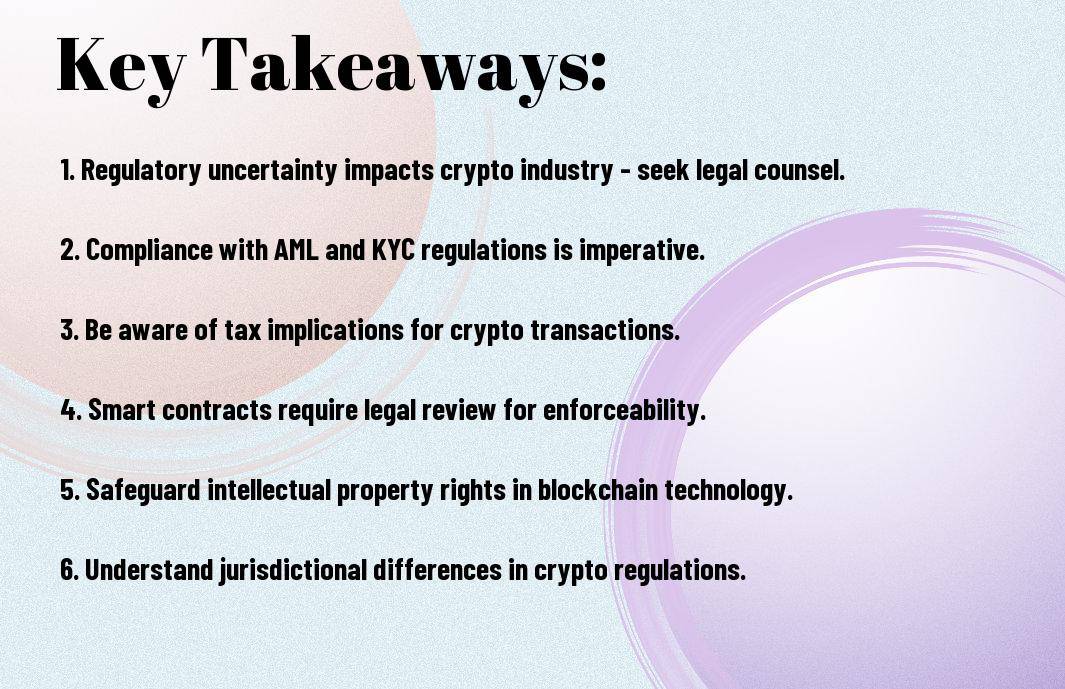Blockchain technology has revolutionized the way we handle transactions, data storage, and even voting systems. However, with this innovation comes a myriad of legal challenges and uncertainties that individuals and businesses operating in the world of cryptocurrencies must navigate. From regulatory compliance to security concerns, understanding the legal landscape of cryptocurrencies and blockchain technology is crucial to ensuring success and mitigating risks.

Key Takeaways:
- Regulatory Compliance: Understanding and adhering to the evolving regulatory framework is crucial to operate legally in the cryptocurrency and blockchain industry.
- AML and KYC: Implementing robust Anti-Money Laundering (AML) and Know Your Customer (KYC) processes is imperative to prevent illicit activities.
- Smart Contracts: Smart contracts coded on blockchain technology have legal implications and must be carefully drafted and reviewed to ensure enforceability.
- Intellectual Property Rights: Protecting intellectual property related to blockchain innovations, such as patents and trademarks, is imperative in this competitive landscape.
- Privacy Laws: Complying with data protection and privacy laws when dealing with user information within blockchain applications is critical to avoid legal repercussions.
- Tax Implications: Understanding the tax implications of cryptocurrency transactions, such as capital gains and losses, is necessary for individuals and businesses in this sector.
- Legal Dispute Resolution: Developing mechanisms for dispute resolution, such as arbitration clauses, within blockchain contracts can facilitate efficient resolution of legal issues.


Understanding Cryptocurrency and Blockchain Fundamentals
What is Cryptocurrency?
With the rise of digital currencies, understanding the concept of cryptocurrency is crucial. Cryptocurrency is a decentralized form of digital currency that utilizes encryption techniques to regulate the generation of units and verify the transfer of funds. Unlike traditional currencies issued by governments, cryptocurrency operates independently of a central authority, making it secure and transparent.
What is Blockchain Technology?
Blockchain technology is the underlying technology that enables the existence of cryptocurrencies. Blockchain is a distributed ledger that records all transactions across a network of computers, creating a transparent and immutable record. Each block in the chain contains a number of transactions, and every time a new transaction occurs, a record of that transaction is added to every participant’s ledger.
Plus, blockchain technology ensures security and trust in the absence of a central authority, making it a revolutionary technology with vast potential beyond cryptocurrencies.
How Cryptocurrencies and Blockchain Work Together
Understanding how cryptocurrencies and blockchain work together is crucial in grasping the full potential of this technology. Cryptocurrencies rely on blockchain technology to secure transactions, create new units, and maintain a distributed ledger. By leveraging blockchain’s decentralized and transparent nature, cryptocurrencies like Bitcoin, Ethereum, and others provide users with a secure and efficient means of transferring value.
The integration of cryptocurrencies and blockchain has opened up endless possibilities for innovation in various industries, from finance to healthcare to supply chain management.
Key Features and Terminology
- Decentralization: Key feature that eliminates the need for a central authority.
- Transparency: Provides a clear record of all transactions on the network.
- Immutability: Once a transaction is recorded on the blockchain, it cannot be altered.
The combination of these features ensures the security and integrity of cryptocurrency transactions, making them reliable and efficient. Any individual with access to the internet can participate in cryptocurrency transactions securely.
Legal Status of Cryptocurrencies Around the World
Global Perspectives on Cryptocurrency Regulation
Legal frameworks surrounding cryptocurrencies vary significantly from country to country, with some embracing them as a legitimate form of payment while others have taken a more cautious approach. Some nations have banned or heavily regulated cryptocurrencies due to concerns about fraud, money laundering, and their potential impact on traditional financial systems. Regulatory bodies in different countries are working to establish guidelines to protect investors and prevent illegal activities involving digital assets.
Cryptocurrency as Property, Currency, or Security
To understand cryptocurrencies’ legal status, it’s crucial to determine how they are classified within each jurisdiction. Depending on the country, cryptocurrencies may be treated as property, currency, or securities. The classification can have far-reaching implications for taxation, ownership rights, and investor protection.
Around the world, governments are grappling with the challenge of categorizing cryptocurrencies within their legal frameworks. The evolving nature of digital assets presents unique challenges for regulators, as they seek to balance innovation with consumer protection and financial stability.
Comparative Analysis of National Approaches
| Country | Approach to Cryptocurrency Regulation |
| United States | Recognizes cryptocurrencies as commodities and subjects them to regulatory oversight by agencies like the SEC and CFTC. |
| China | Has banned initial coin offerings (ICOs) and cryptocurrency exchanges but is exploring the development of a central bank digital currency. |
| Japan | Recognizes Bitcoin as legal tender and has established a licensing system for cryptocurrency exchanges. |
Regulatory approaches to cryptocurrencies vary widely, reflecting the diverse attitudes and concerns of governments around the world. While some countries are fostering innovation and welcoming digital currencies, others are taking a more restrictive approach to protect their financial systems and consumers.

Regulatory Framework for Blockchain Technology
After referencing the comprehensive overview on the legal landscape of cryptocurrency provided in Outlining the Legal Landscape of Cryptocurrency, it is crucial to explore into the regulatory framework surrounding blockchain technology. Understanding the legal implications of blockchain and its various applications is paramount in navigating this evolving landscape.
Understanding Smart Contracts Legally
Technology has introduced the concept of smart contracts, self-executing contracts with the terms directly written into code. While these contracts offer efficiency and automation, there are legal considerations to address. Smart contracts are recognized as legally binding agreements in many jurisdictions, but challenges may arise in enforcement and interpretation. It is vital for businesses utilizing smart contracts to ensure compliance with existing contract law and consider implications in case of disputes.
Blockchain and Data Protection Laws
Contracts involving blockchain technology raise concerns regarding data protection and privacy laws. It is crucial to navigate the intersection of blockchain and data protection regulations to ensure compliance and safeguard sensitive information. As blockchain operates on a decentralized and transparent ledger, reconciling data protection laws like GDPR with the immutable nature of blockchain poses intricate challenges.
Blockchain technology allows for secure and transparent transactions, offering efficiency and trust in financial processes. To harness the benefits of blockchain in financial transactions, regulators are developing frameworks to oversee and monitor these activities to prevent misuse and ensure compliance with financial regulations.
Regulation of Blockchain Financial Transactions
Understanding the regulatory landscape for blockchain financial transactions is vital for businesses operating in this space. Regulators worldwide are exploring ways to oversee blockchain transactions and implement measures to combat fraud, money laundering, and other illicit activities. Compliance with anti-money laundering (AML) and know your customer (KYC) regulations is critical for entities engaging in blockchain financial transactions.
Decentralized Autonomous Organizations (DAOs)
Financial transactions conducted through DAOs are revolutionizing traditional business structures by operating autonomously through code and decentralized governance. These entities raise novel legal questions related to liability, accountability, and regulatory oversight. It is vital for stakeholders to understand the implications of participating in or transacting with DAOs to navigate this innovative yet complex landscape.
Taxation of Cryptocurrency Transactions
Despite the decentralized and somewhat anonymous nature of cryptocurrencies, they are not exempt from taxation. In fact, tax authorities around the world are increasingly focusing on the taxation of cryptocurrency transactions. This aspect of the legal landscape is complex and constantly evolving, presenting challenges for both individual investors and businesses operating in the crypto space.
Reporting and Compliance for Crypto Assets
One of the key challenges in the taxation of cryptocurrency transactions is ensuring proper reporting and compliance. The IRS in the United States, for example, requires taxpayers to report their cryptocurrency transactions and pay taxes on any gains. Failure to do so can result in penalties or even legal action. It is crucial for individuals and businesses involved in crypto assets to understand the reporting requirements and stay up to date with regulatory developments.
International Tax Considerations
The international nature of cryptocurrency transactions can complicate tax matters further. The tax treatment of cryptocurrency varies from country to country, and issues such as double taxation can arise. The movement of digital assets across borders also raises questions about which jurisdiction has the right to tax such transactions. It is important for taxpayers with international crypto dealings to seek professional advice to navigate potential pitfalls.
The taxation of cryptocurrency can be particularly challenging when it comes to cross-border transactions and investments. Regulations differ widely between countries, and the lack of a uniform approach to taxing cryptocurrencies can create confusion and compliance issues for taxpayers.
Taxation of Cryptocurrency Mining and Forks
Taxation of cryptocurrency mining rewards and forks is another complex area. Cryptocurrency mining involves validating transactions on the blockchain and adding them to the public ledger. Miners are rewarded with new coins for their efforts, which are subject to taxation as income. Forks, which occur when a blockchain splits into two separate chains, can also have tax implications depending on how the new coins are treated.
The taxation of cryptocurrency mining and forks is an evolving area, and taxpayers should stay informed about the latest guidance from tax authorities. It is crucial to keep detailed records of mining activity and fork transactions to accurately report them for tax purposes.
Assets in the form of cryptocurrencies can offer significant benefits, but it’s crucial to understand the complex tax implications associated with these assets to avoid potential legal issues.
Cryptocurrency and Anti-Money Laundering (AML) Compliance
Know Your Customer (KYC) and AML Regulations
One of the key components of AML compliance for cryptocurrency businesses is Know Your Customer (KYC) regulations. These regulations require businesses to verify the identity of their customers to prevent money laundering and terrorist financing. By collecting identifying information such as government-issued IDs and proof of address, businesses can mitigate the risk of facilitating illicit activities through their platforms.
Challenges in Enforcing AML Laws with Cryptocurrencies
Cryptocurrencies present unique challenges in enforcing AML laws due to their decentralized and pseudonymous nature. Monitoring and tracking transactions across various blockchain networks can be complex, making it difficult for regulatory authorities to detect suspicious activities. Additionally, the cross-border nature of cryptocurrency transactions further complicates AML enforcement efforts, as jurisdictional boundaries can blur.
Laws
Cryptocurrencies bring about a host of challenges for regulatory authorities when it comes to enforcing AML laws. The lack of centralized control in the cryptocurrency ecosystem makes it harder to hold individuals or entities accountable for money laundering activities. Moreover, the use of privacy-focused cryptocurrencies can enable criminals to obfuscate their identities and evade detection by authorities.
Strategies for Complying with AML Standards
Any business operating in the cryptocurrency space must adopt robust compliance programs to adhere to AML standards. Implementing transaction monitoring tools, conducting regular risk assessments, and providing ongoing staff training are vital components of an effective AML compliance strategy. By integrating AML measures into their operations, businesses can demonstrate their commitment to preventing financial crimes and protect their reputations.
For more information on AML compliance in the cryptocurrency industry, it is crucial for businesses to stay informed about evolving regulatory requirements and industry best practices. Adhering to AML standards not only helps businesses avoid legal repercussions but also fosters trust and credibility among investors and customers. As the landscape of cryptocurrencies continues to evolve, staying proactive in AML compliance will be paramount for businesses to thrive in a safe and secure market environment.
Intellectual Property (IP) Considerations in Blockchain Technology
Protecting IP Within the Blockchain Ecosystem
To safeguard intellectual property (IP) within the blockchain ecosystem, companies must implement strategies that emphasize the importance of protecting their creations. This includes securing patents for innovative blockchain solutions, copyrights for original content, and trade secrets for valuable information. By registering IP assets on the blockchain, companies can establish tamper-proof evidence of ownership and creation, enhancing their IP protection measures.
Copyright, Patent, and Trade Secrets Concerns
Trade secrets within blockchain technology are particularly vulnerable due to the transparent nature of the decentralized ledger. Companies must strive to maintain confidentiality through encryption techniques and access controls to prevent unauthorized access to valuable information. Copyright and patent concerns arise when determining the ownership of content and technological innovations created using blockchain technology.
This requires in-depth analysis of existing IP laws and regulations to ensure compliance with legal requirements. Companies must navigate the complexities of IP protection within the blockchain space to safeguard their innovations and assets from potential infringement.
Use of Blockchain for IP Management and Protection
Any company involved in creating, utilizing, or trading intellectual property can benefit from leveraging blockchain technology for management and protection. Blockchain offers a secure and immutable way to track IP rights, licensing agreements, and royalties, reducing disputes and enhancing transparency in IP transactions. Implementing smart contracts on the blockchain can automate IP processes, enforce licensing terms, and ensure that all parties adhere to agreed-upon terms.
Plus, blockchain can also streamline the process of IP registration and verification, reducing administrative burdens and costs associated with traditional IP management systems. By embracing blockchain for IP management, companies can revolutionize how they protect and monetize their intellectual property in a rapidly evolving digital landscape.
Resolving Disputes in the Blockchain Space
The Role of Arbitration and Mediation
Keep in mind that resolving disputes in the blockchain space requires a nuanced approach due to the decentralized nature of the technology. Arbitration and mediation can play a crucial role in settling conflicts efficiently and cost-effectively. These alternative dispute resolution methods offer parties more flexibility and privacy compared to traditional litigation.
Litigation Challenges Unique to Blockchain and Cryptos
Blockchain technology presents unique challenges in litigation, especially when it comes to proving ownership, tracing transactions, and enforcing judgments across borders. The pseudonymous nature of cryptocurrency transactions can make it difficult to identify and locate parties involved in disputes.
Another aspect to consider is the international dimension of blockchain disputes, where jurisdictional issues and varying regulatory frameworks can complicate legal proceedings. Resolving conflicts effectively in this complex environment requires a deep understanding of both blockchain technology and legal intricacies.
Jurisdiction and Governing Law for Blockchain Disputes
Resolving disputes in the blockchain space involves navigating jurisdiction and determining the applicable governing law. The decentralized nature of blockchain networks raises questions about which jurisdiction has authority over disputes and which legal framework should apply.
Blockchain technology’s borderless nature adds complexity to jurisdictional issues, as transactions can occur across multiple jurisdictions simultaneously. Determining the most appropriate forum for resolving disputes and establishing the governing law are critical considerations for parties involved in blockchain-related conflicts.
The Future of Cryptocurrency and Blockchain Regulation
Mediation and other forms of alternative dispute resolution are likely to play a significant role in shaping the future of cryptocurrency and blockchain regulation. As the legal landscape continues to evolve, finding efficient and effective ways to resolve disputes will be imperative for fostering trust and stability in the blockchain ecosystem.
Blockchain technology’s rapid expansion and increasing adoption across industries highlight the importance of establishing clear regulatory frameworks to address legal challenges and protect the rights of parties involved in blockchain transactions.
Best Practices for Navigating the Legal Landscape
Cryptocurrency and blockchain participants should prioritize understanding the legal implications of their actions and transactions to avoid potential disputes. Engaging legal experts with expertise in blockchain technology can provide valuable guidance and help navigate the evolving regulatory environment.
Challenges such as regulatory uncertainty, security risks, and compliance complexities underscore the need for proactive risk management and adherence to best practices in the blockchain space. By staying informed and proactive, parties can mitigate legal risks and contribute to the long-term sustainability of the blockchain ecosystem.
Final Thoughts on the Evolving Nature of Crypto Law
For a comprehensive understanding of the evolving nature of crypto law, it is imperative to continuously monitor regulatory developments and stay informed about emerging legal trends in the space. As the legal landscape adapts to the complexities of blockchain technology, parties must be prepared to navigate potential challenges and seize opportunities for growth and innovation.
FAQ
Q: What is the legal landscape around cryptocurrencies and blockchain technology?
A: The legal landscape around cryptocurrencies and blockchain technology is constantly evolving, with regulations varying widely from country to country. It is vital for individuals and businesses operating in this space to stay informed about the latest legal developments.
Q: Are cryptocurrencies legal?
A: The legality of cryptocurrencies varies by jurisdiction. While some countries have embraced cryptocurrencies and developed clear regulations, others have banned or restricted their use. It is crucial to understand the legal status of cryptocurrencies in your location.
Q: How are blockchain transactions regulated?
A: Blockchain transactions are typically regulated by the laws governing financial transactions in each jurisdiction. Many countries require entities engaging in blockchain transactions to comply with anti-money laundering (AML) and know your customer (KYC) regulations.
Q: What are the tax implications of using cryptocurrencies?
A: The tax implications of using cryptocurrencies vary by jurisdiction. In many countries, cryptocurrencies are considered taxable assets, and individuals are required to report their cryptocurrency transactions for tax purposes. It is important to consult with a tax professional to understand your obligations.
Q: How can I ensure compliance with legal regulations when using cryptocurrencies?
A: To ensure compliance with legal regulations when using cryptocurrencies, individuals and businesses should stay informed about the laws in their jurisdiction, implement strong AML and KYC procedures, and seek legal counsel when needed.
Q: What are the risks of non-compliance with cryptocurrency regulations?
A: The risks of non-compliance with cryptocurrency regulations can include fines, legal penalties, reputational damage, and even criminal charges in severe cases. It is crucial to take legal compliance seriously in the cryptocurrency space.
Q: How can I protect my investments in cryptocurrencies legally?
A: To protect your investments in cryptocurrencies legally, it is important to choose reputable exchanges and wallets, keep thorough records of your transactions for tax purposes, and be vigilant against scams and fraudulent schemes in the cryptocurrency market.



